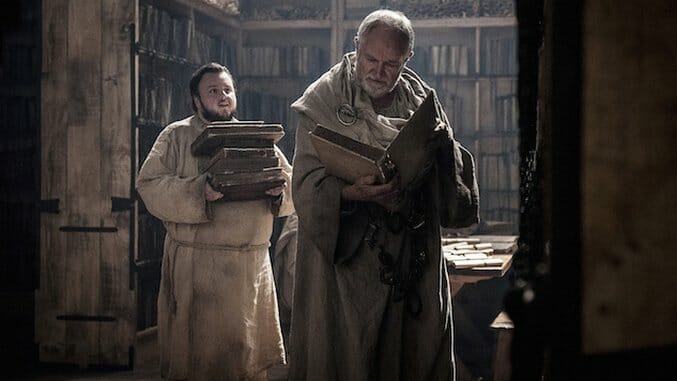Game of Theories: Why We’re So Fixated on “Figuring Out” Game of Thrones
Photo: Helen Sloan/courtesy of HBO
In his first appearance in Game of Thrones’ seventh season, Samwell Tarly (John Bradley-West), First of His Name, Curer of Greyscale, Reader of Tomes, Follower of Instructions, Slayer of White Walkers, Janitor of the Citadel, has a frank, validating conversation with Archmaester Ebrose (Jim Broadbent) about the existence of those nasty, previously mentioned White Walkers. Poor Sam, ever the schlemiel to Thrones’ cast of schmucks, laments that nobody believes in his accounts of the ancient nemeses of humankind; in point of fact, he mopes, “they all doubt the Walkers ever existed in the first place.”
Ebrose, not one to dismiss a chronicle out of hand, gives Sam half the reply he desperately needs to hear: “The simplest explanation for your grating obsession with the White Walkers is that you’re telling the truth, and that you saw what you say you saw.” Sam’s relief is curtailed by the realization that much as Ebrose believes him, he’s not going to help him bust into the Citadel library’s restricted section, either. But the value of Ebrose’s commentary isn’t restricted to Sam as a character: Really, it’s good advice for Game of Thrones’ theory-fixated audience, Occam’s razor applied to a show that needs no more unnecessarily complicated plot hypotheses.
Granted, Ebrose, in accepting Sam’s reports of White Walker activity beyond the Wall, appears to be acceding to a complex truth rather than a streamlined truth. The simplest explanation, as he puts it, is pretty damn abstruse. It means accepting the existence of an eldritch humanoid race with no allegiance to any governing body in the Seven Kingdoms, which means concurrently accepting the existence of the undead, which also means accepting the influence of magic upon reality. Asking people to buy what Sam’s selling as truth is a big ask. In Game of Thrones, Ebrose is endorsing what amounts to wild speculation based on coincidences and happy accidents submitted by a handful of “unconnected sources.”
For us, though, Sam’s exchange with Ebrose feels like a not-unintentional, if slightly indirect, message to viewers: Despite Game of Thrones’s reputation for unpredictability, the likeliest direction the show will follow is the most obvious direction. That’s a message worth heeding when it comes to a series that isn’t discussed or analyzed as much as it’s dissected; episode to episode, week to week, HBO’s fantasy epic begets thesis after thesis, conjecture after conjecture, regarding twists, surprises, potential plot courses, incoming character deaths, and too much else that has nothing to do with the actual content of the damn show. We’re too concerned, seven seasons into the narrative, about what-ifs and whens and who-bys, things that have yet to happen, and all at the expense of the things that actually have happened.
-

-

-

-

-

-

-

-

-

-

-

-

-

-

-

-

-

-

-

-

-

-

-

-

-

-

-

-

-

-

-

-

-

-

-

-

-

-

-

-








































